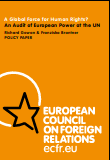№ 08 A GLOBAL FORCE FOR HUMAN RIGHTS? AN AUDIT OF EUROPEAN POWER AT THE UN
№ 08 A GLOBAL FORCE FOR HUMAN RIGHTS? AN AUDIT OF EUROPEAN POWER AT THE UN
Author(s): Richard Gowan, Franziska Brantner
Subject(s): Politics / Political Sciences, Law, Constitution, Jurisprudence, International Law, Human Rights and Humanitarian Law, Geopolitics
Published by: ECFR European Council on Foreign Relations
Summary/Abstract: The European Union (EU) is suffering a slow-motion crisis at the United Nations (UN). The problem is not a lack of internal cohesion, which has improved markedly since the nadir of the Iraq War. The problem is fading power to set the rules of the game. The EU’s members insist that the UN is central to their vision of international order and universal human rights – but the UN is increasingly being shaped by China, Russia and their allies. This paradox has come to the fore in 2008 as the EU has tried to work through the UN on Burma and Zimbabwe, yet been unable to get Security Council resolutions for action. These defeats come on top of previous setbacks for the EU at the UN in cases from Kosovo to Darfur.
This is partially due to geopolitical shifts. But this report shows that the EU has also been the architect of its own misfortune. Europe has lost ground because of a reluctance to use its leverage, and a tendency to look inwards – with 1,000 coordination meetings in New York alone each year – rather than talk to others. It is also weakened by a failure to address flaws in its reputation as a leader on human rights and multilateralism.
If Europe can no longer win support at the UN for international action on human rights and justice, overriding national sovereignty in extreme cases, it will have been defeated over one of its deepest convictions about international politics as a whole. This is particularly true in cases involving the Responsibility to Protect against genocide and mass atrocities, when the humanitarian consequences of inaction are most severe.
Series: ECFR Policy Briefs
- Print-ISBN-13: 978-1-906538-07-1
- Page Count: 85
- Publication Year: 2008
- Language: English
- eBook-PDF
- Introduction
- Table of Content

